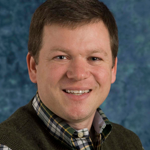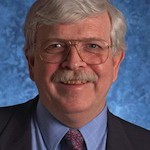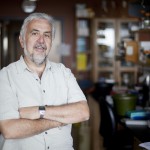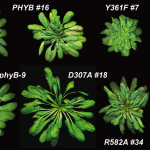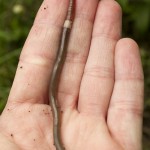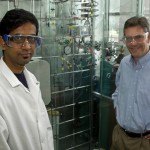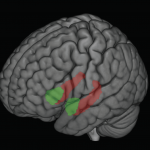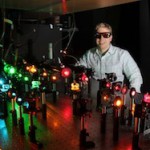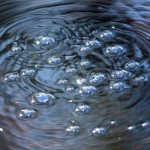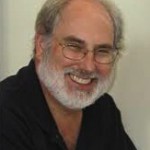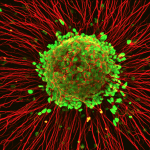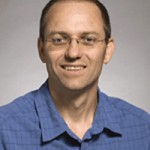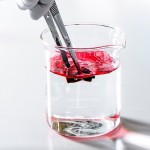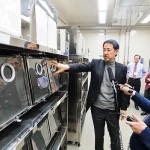Tag Biosciences
Herbarium director receives award for telling the story of plants
Ken Cameron, director of the Wisconsin State Herbarium, received the Peter Raven Award from the American Society of Plant Taxonomists Aug. 5. Cameron, also a professor of botany at the University of Wisconsin–Madison, is a world expert on the orchid family.
New analysis links tree height to climate
What limits the height of trees? Is it the fraction of their photosynthetic energy they devote to productive new leaves? Or is it their ability to hoist water hundreds of feet into the air, supplying the green, solar-powered sugar factories in those leaves?
Mining bacterial blueprints yields novel process for creation of fuel and chemical compounds
A team of researchers at the University of Wisconsin–Madison has identified the genes and enzymes that create a promising compound — the 19 carbon furan-containing fatty acid (19Fu-FA). The compound has a variety of potential uses as a biological alternative for compounds currently derived from fossil fuels.
Tricking plants to see the light may control the most important twitch on Earth
Copious corn growing in tiny backyard plots? Roses blooming in December? Thanks to technology that the University of Wisconsin–Madison’s Richard Vierstra has been developing for years, these things may soon be possible. And now, new findings out of the genetics professor’s lab promise to advance that technology even further.
Hungry, invasive ‘crazy worm’ makes first appearance in Wisconsin
Wisconsin's newest invasive species has done its best to stay underground, but the voracious, numerous and mysterious Asian crazy worm has emerged for the first time in the state on the campus of the University of Wisconsin–Madison.
Aviation offers a way forward in biofuels research
Biofuels researchers are increasingly thinking about how the energy market is changing, which challenges them to balance the basic science of new fuels with a more holistic view of the most commercially viable ways to produce them. So when a group of University of Wisconsin–Madison researchers began looking at how to make jet fuel from biomass, they also strived to create a "techno-economic" framework that would illuminate the entire biofuels field.
Early life stress can leave lasting impacts on the brain
For children, stress can go a long way. A little bit provides a platform for learning, adapting and coping. But a lot of it - chronic, toxic stress like poverty, neglect and physical abuse - can have lasting negative impacts.
Yeast researcher, Chris Hittinger, named Pew Scholar in Biomedical Sciences
A University of Wisconsin–Madison researcher, well known for his work studying yeast fermentation, has been named a Pew Scholar in the Biomedical Sciences by the Pew Charitable Trusts.
Novel collaboration links pharmaceutical expertise in Wisconsin, Taiwan
In a ceremony in San Diego on Tuesday, June 24, the University of Wisconsin–Madison, a world leader in biomedicine, will sign an agreement to collaborate with the Development Center for Biotechnology (DCB), a Taiwanese biotech non-profit.
Shaw awards go to two UW researchers
One scientist studying how HIV spreads in the body and another examining cellular machinery and its role in disease have earned funding from the Greater Milwaukee Foundation to advance their research.
Long lost WWII soldier returned to family with help of UW–Madison scientists
No longer missing, Pfc. Lawrence S. Gordon is finally on his way home.
De-extinction: Will dead species live again?
De-extinction is a recent term that involves bringing back an extinct species using DNA that’s been recovered from preserved material. There are two ways that it can be accomplished: one would be cloning to produce a copy of an extinct individual’s genome. The second way is through genetic engineering to re-create a close approximation of what the extinct species’ genome might have once been. The reality is that it’s no longer science fiction. We’re getting close to being able to revive extinct species from recovered DNA.
UW-Madison’s Gourse elected to American Academy of Arts and Sciences
University of Wisconsin–Madison bacteriologist Richard L. Gourse is among leaders from academia, business, public affairs and the arts and humanities elected to membership in the American Academy of Arts and Sciences, it was announced today (Wednesday, April 23).
First in the nation: UW–Madison establishes post-doc in feminist biology
Feminist biology - which attempts to uncover and reverse gender bias in biology - will be the focus of a new, endowed fellowship in the Department of Gender and Women's Studies at the University of Wisconsin–Madison.
TIP/White-nose Syndrome affecting bats in Wisconsin
4/16/14TO: Media representativesFROM: Nik Hawkins, nihawkin@vetmed.wisc.edu, 608-263-6914RE: TIP/WHITE-NOSE SYNDROME AFFECTING BATS IN WISCONSIN
Study helps unravel the tangled origin of ALS
By studying nerve cells that originated in patients with a severe neurological disease, a University of Wisconsin–Madison researcher has pinpointed an error in protein formation that could be the root of amyotrophic lateral sclerosis.
Small scale, large potential: An expert weighs in on the future of microfluidics
More than a decade ago, David Beebe wrote that the field of microfluidics had the potential to significantly change modern biology. Now Beebe, an expert in the field, has written a high-level perspective on the state of microfluidics for the journal Nature.
UW-Madison flu expert recognized for research excellence
Yoshihiro Kawaoka, a professor of virology at the University of Wisconsin–Madison School of Veterinary Medicine known for his groundbreaking work on influenza, has received the 2014 Excellence in Research Award from the Association of American Veterinary Medical Colleges (AAVMC).

